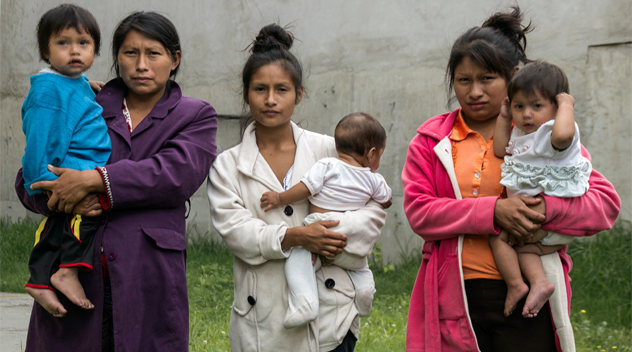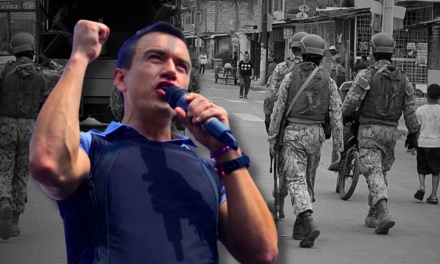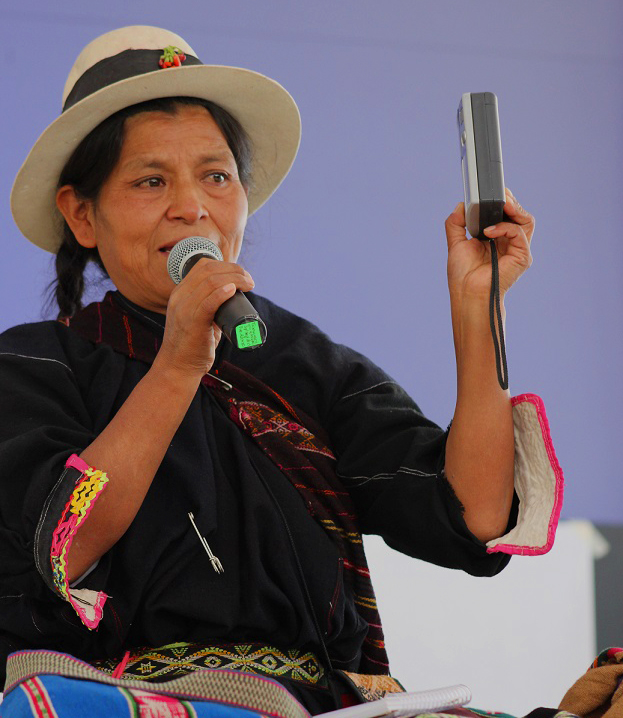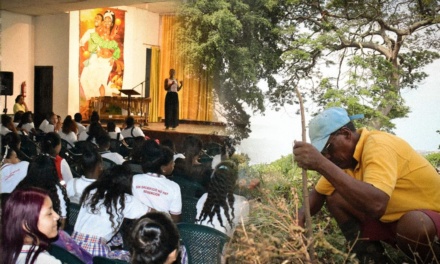por Verónica Calvopiña @kinoraxx
traducción Leidy Rogers
The testimonies that I am going to share below are not the testimonies of Syrian women fleeing the war (in part) caused by the Islamic State; neither are they of Palestinian families displaced by Israelis who occupy their lands. The testimonies that I am going to share are of four Ecuadorian women in a position that very few people talk in their favor: they are women, they are indigenous, they are shuar, and they are up against both the power of the state and the repressive forces and capital of one of the most powerful countries in the world: China.
The reason that these testimonies were not made known before is that the government of Ecuador prohibited any entry into the area, it was militarized, and information was limited because of the State of Exception. The area managed by the mining project was controlled and militarized, along with the territory of the Shuar people that is located outside the controlled area of the mine.
Like in total war the victims must be hidden and silenced.
The militarization and the forced displacement of Shuar communities shows that the violation of the rights of the vulnerable groups like pregnant women and children did not exist for the government.
The State of Exception has been in force for two months in order to protect “citizen security” but the testimonies of four Shuar women show that it has been the state that has caused the displacement and terror in the Shuar communities.
“The Testimonies”
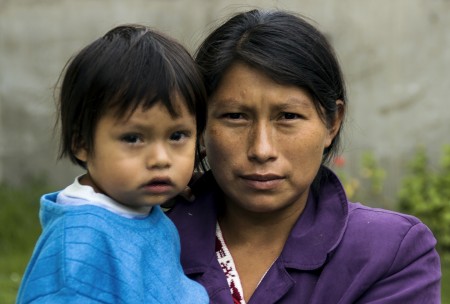 “On the 18th of December, the government gave the order to the military. First they arrived at Nankints, later they entered the community of Tsanstuim. It caused us to leave without taking anything. I took my three children, I left all of my things and we went to another community. On the road we had an accident happen to us, my children fell in a place where we were walking, the country roads were so ugly; thank God a teacher accompanied us that worked with the students. He helped me carry my children because they fell down in the mud; my conscience hurt so much that I began to cry bitterly. It is mistake for me that I am a woman who is alone.”
“On the 18th of December, the government gave the order to the military. First they arrived at Nankints, later they entered the community of Tsanstuim. It caused us to leave without taking anything. I took my three children, I left all of my things and we went to another community. On the road we had an accident happen to us, my children fell in a place where we were walking, the country roads were so ugly; thank God a teacher accompanied us that worked with the students. He helped me carry my children because they fell down in the mud; my conscience hurt so much that I began to cry bitterly. It is mistake for me that I am a woman who is alone.”
In this way María Alluy relates her escape in the rain forest. She and her 3 children fled the community of Tsanstuim after the raid by the military and police as part of the State of Exception Morena Santiago ordered beginning December 14th, 2016. The order was given by the government of Ecuador to protect a camp belonging to the Chinese mining company Explorcobres, SA, EXSA.
María was not the only one; the whole community was displaced along with her. 40 families that lived in Tsenstuim, amongst them children and pregnant women, fled at the appearance of 500 soldiers that, according to 18 year old Claudia Chumpi, arrived shooting at the community: “It was a Saturday that I went to the community of Tsunsuim, with my two sisters and my family. 500 soldiers arrived shooting. We ran as we were [without time to grab any belongings], the children, the pregnant mothers were frightened. We ran up the mountain, the soldiers were stationed in every house, they broke down the doors, they threw things out of pans, they took the cylinders of gas we use to cook.”
The families had to go through the mountains by roads covered with mud to get to Tink, a community that accepts them. They walked with their children without eating, without shelter from the sun or rain. In the middle of the walk two pregnant women gave birth, without being cared for, without adequate attention, which put their lives and the lives of the small newborns at risk. One of the woman’s health is still in serious condition. As Claudia tells it: “My aunt gave birth over there, the baby almost died. We attended her ourselves, we did not have anything. We sharpened a stick to cut the cord.” Other women, like the daughter of María were left in the middle of the walk because she could not put up with the weight of her belly and came later with her other four children who were all running from the military. After several days they arrived at Tink. Before the State of Exception Tink was made up of 20 people, now there are around 300. The community lent small rooms, some clothes, and pans to the displaced, and their children are allowed to go to school, however, they do not have all that is necessary to live.
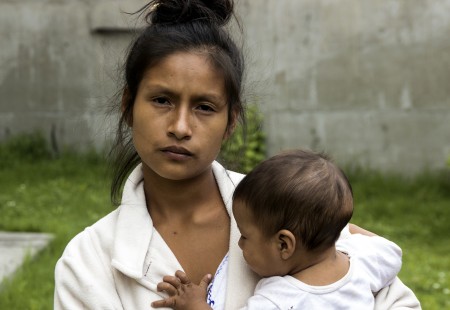 The families of Nankints are in Tink, evicted in August 2016 by the mining company Explorcobres and the police. In Tink there are also the displaced people of other communities like Marbella and Tsuntsuim, driven out by the State of Exception ordered in December 2016. Now the mining camp La Esperanza is where Nankints was, the territory is enclosed and is impossible to enter. Tsuntsuim is uninhabitable and the houses destroyed. Upon leaving abruptly from their houses, the women lost the crops, their animals and their territory, causing them problems with the health and food supply of their families.
The families of Nankints are in Tink, evicted in August 2016 by the mining company Explorcobres and the police. In Tink there are also the displaced people of other communities like Marbella and Tsuntsuim, driven out by the State of Exception ordered in December 2016. Now the mining camp La Esperanza is where Nankints was, the territory is enclosed and is impossible to enter. Tsuntsuim is uninhabitable and the houses destroyed. Upon leaving abruptly from their houses, the women lost the crops, their animals and their territory, causing them problems with the health and food supply of their families.
Now they do not have enough food, or pans and plates. All of their things they lost with their houses, they left with only the clothes they were wearing. They do not have clothes, shoes, or school supplies.
To this add the constant fear that they suffer because of the presence of the helicopters and drones that constantly pursue them. In addition they are terrified for the situation of their husbands, who ran away because they feared that the soldiers would arrest them blaming them for the death of the police this past December.
Claudia, barely 18 years old, bears the loss of her house, the absence of her husband, and the hunger and sadness of her children who since arriving at Tink live in permanent fear because of the constant political persecution: “The children have fear, are scarred. They are not studying. When an airplane passes, they are scarred, they run. When there is a camera they are equally scarred, the soldiers send a camera into the community to see if we are here.”
Mónica Ambama, a 32 year old woman and a mother of seven children, does not understand what happened. She does not understand why these actions were taken against the Shuar People. “We have not wanted the mine because there is contamination. We do not want them to contaminate our nature, the water. We also are human; they say the Shuar don’t have rights. Why do we not have rights? Perhaps we are not humans? We also have full rights to demand.”
She was evicted first from Nankints and later from Tsunsuim. She shares that in the eviction of August 11th, her house and her things were buried by the backhoes, not giving her time to save anything. She asks that the government stop the mining activity in her territory to secure that the farming of the field also is developed and says that they want to be consulted: “They have not consulted us, they came to us only to destroy. They say they have paid us but we have not taken one thing from EXSA china. I can say to Mr. President, why do you make us suffer so much? What have we done to Correa? Only when there is mining he will recognize development? All the time there is development with farming. He says to farmers, to the Shuar, that we help, that we are served. We are not served well, we suffer more. I would like President Correa to visit the center of the action for him to see [what is happening] and speak the truth, saying that he will not damage us and he will leave us in peace.”
Claudia, like Mónica, rejects the mining, asking where the rights of the community are: “We do not want the mining. The soldiers say that the government ordered the mining, but we do not want there to be so much damage. Where is the buen vivir (good living)? Where are the rights of the children, of the women?”
Article 57 of the Ecuadorian Constitution grants free consultation and information to indigenous peoples, promises no displacement, and limits extraction activities in their territories. All of these rights are being denied to the Shuar women of the communities of Nankints, Tsunsuim, andTundayme. The people of these communities were evicted and displaced. They were denied their rights, which violates the Constitution in order to implement the two big projects of open-pit Megamining, named San Carlos Panantza and Mirador. Chinese companies conduct both of these projects.
These projects unveil the era of mining in Ecuador and promise to change it into a great exporter of copper; but at what price ask Mónica and Claudia. Where remain the rights of the women and children? Where remain the rights of the Shuar people?
In a war, the women and the children are the most affected, and this war is not an exception. The consequence of this war, caused by extractivism and waged against the amazon communities, will remain marked in the bodies and environment of the Shuar people.

